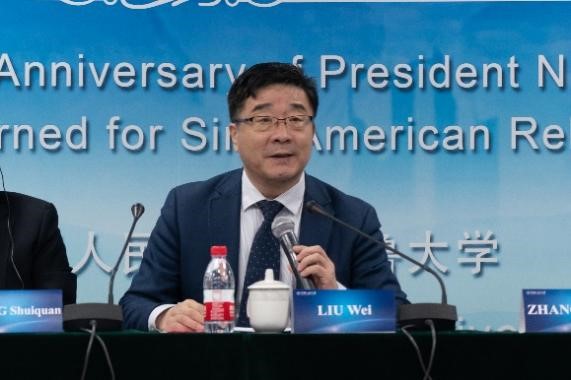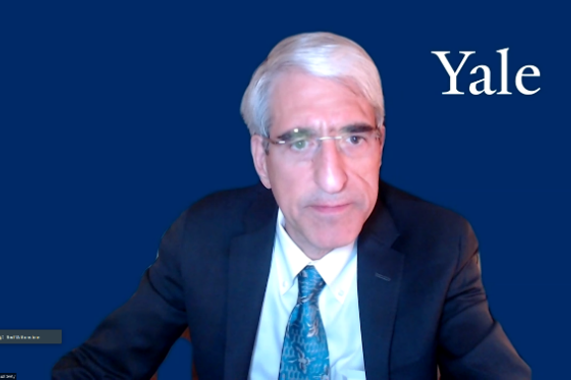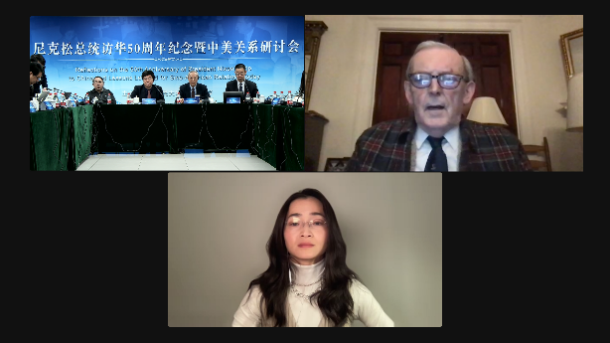NEWS & EVENTS
Reflections on the 50th Anniversary of President Nixon’s Trip to China and Lessons Learned for Sino-American Relations Successfully Held
On February 25th, 2022, Renmin University of China and Yale University collaborated to host a seminar titled Reflections on the 50th Anniversary of President Nixon's Trip to China and Lessons Learned for Sino-American Relations Today.
The event was held in a hybrid format, comprising both online and offline sessions. This was made possible by the Center for International Security and Strategy, a part of Renmin University's School of International Studies, and the International Securities Studies program, which operates under Yale University's Jackson Institute for Global Affairs.
Over 30 distinguished scholars and experts joined the seminar, including notable figures such as former US Secretary of State, Dr. Henry Kissinger, Ms. Qiu Yuanping, former Director of the Overseas Chinese Affairs Office of the State Council, and Ms. Fu Ying, former Deputy Foreign Minister. The eminent guests shared their insights and perspectives on the occasion and participated in interactive discussions on the topic.

In his opening speech, Liu Wei, President of the Renmin University of China, extended his warm welcome and hope for the successful convening of the seminar and expressed his gratitude to the leaders, experts and scholars joining from both sides. He pointed out that US President Nixon's visit to China 50 years ago started a new process of bilateral relations, and the Shanghai Communiqué published during that period not only laid an important cornerstone of Sino-US relations but also provides important inspiration for dealing with the current complicated bilateral relations. Under the current situation of profound changes in the international political and economic structure, it is especially necessary to regain the historical wisdom of seeking common ground while reserving differences. It is crucial to recognize our shared interest and seek mutual benefit and a win-win situation with firm confidence and determination to strengthen cooperation, deal with challenges, stabilize and develop Sino-US relations to benefit the two countries and the peoples of all countries.


Yale University President Peter Salovey expressed his gratitude to the guests and organizers of the seminar in his opening speech and spoke highly of the historic significance of the landmark meeting between Nixon and Chairman Mao Zedong. He also specifically mentioned the outstanding achievements of Dr. Henry Kissinger, and highlighted the value his writings and donated archives have for historical research and future leaders. At a time when Sino-US relations are facing special challenges, he expects that scholars and policymakers of the two countries can draw lessons from historical reflections and discussions, seek useful measures to manage the economic and security competition between the two countries, and promote peace and stability.
Furthermore, Zheng Shuiquan, Vice Chairman of the University Council at the Renmin University of China, attended the opening ceremony.

The theme of the first session was Reflection on 1972. Former U.S. Secretary of State Dr. Henry Kissinger reflected on the history of Nixon's visit to China and the publication of the Sino-U.S. Shanghai Communiqué. He inspired the two sides to manage differences and promote cooperation in the current new technological and political environment. Ambassador Fu Ying and Professor John Lewis Gaddis from Yale University, further contributed to the discussion.


The theme of the second session of the symposium was Lessons from History: Avoiding a New Cold War. It was co-hosted by Professor Yang Guangbin, Dean of School of International Studies, Renmin University, and Professor Odd Arne Westad, Director of the International Security Studies research hub and Elihu Professor of History and Global Affairs at Yale University. The experts in this session discussed the historical experience of the normalization of Sino-US relations, the changes in the international pattern, and the responsibility of major powers to the international order.


The third session of the symposium, with the theme Trade, Investment and Technology Competition: Averting Economic Conflict, was co-hosted by Liu Yuanchun, Vice President of the Renmin University of China and Richard Levin, former President of Yale University. Together with other participants, they reviewed the history of Sino-US economic, trade, investment, and technological relations based on their own experiences, analyzed the current situation and possible trends in 2022, and put forward related proposals to rebuild mutual trust, avoid conflicts and enhance cooperation.


The fourth session of the symposium, with the theme Bilateral Security Competition: Preventing Miscalculation and Avoiding Escalation, was co-hosted by Li Chen, associate professor at the School of International Studies at the Renmin University of China and director of the Center for International Security and Strategy, and Edward Wittenstein, executive director of the Johnson Center for the Study of American Diplomacy at Yale University. Together with other participants, they conducted in-depth discussions on the risks and management of traditional military security competition and competition in emerging strategic domains between US and China.

Professor Westad and Professor Yang Guangbin delivered the concluding remarks. Professor Westad opined that the seminar offered a frank and rewarding exchange of ideas, and both sides presented insightful views and suggestions that could help stabilize bilateral relations. He stated that scholars must examine the fundamental principles of the international system and devise methods for creating a stable international system that addresses the needs of the present era. This process would demand effective communication between China, the United States, and other countries, and collective efforts. Professor Yang started his remarks by expressing gratitude to the leaders, experts, scholars, students, and conference staff who had supported and partaken in the forum. He noted that the conference was energizing and, to avert a “new Cold War, “ the two sides needed to recognize and respect each other's differences and strive towards consensus. He hoped that this dialogue would serve as a starting point for closer institutional-level cooperation between the two universities and the two schools to promote deep mutual understanding and common development.


